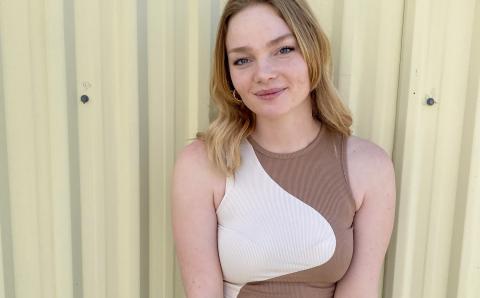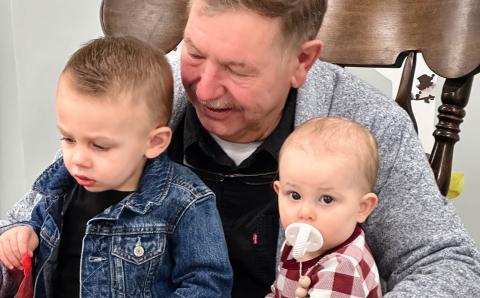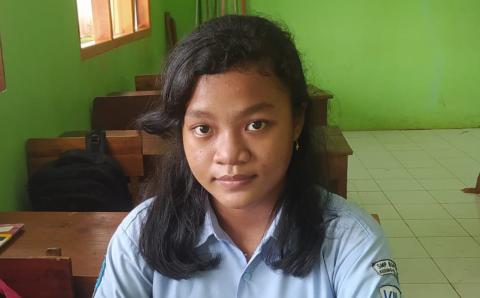Laura Pritchard’s missionary journey started in 2005 when she was standing on a street corner in Liberia, West Africa.
It was nearly 200 years after 15,000 free-born Black people, facing social and legal oppression in the U.S., were “repatriated” and relocated to the land of fufu (a favorite food of the Bassa people and the man who would become Laura Pritchard’s husband), waterfalls, and palm-fringed beaches.
That day in 2005 was Pritchard’s second visit to Liberia via a sister-church relationship between Madison Square Christian Reformed Church in Grand Rapids, Mich., and Providence Baptist Church in Liberia’s capital, Monrovia, named after James Monroe, the fifth president of the U.S. and a supporter of Liberia’s colonization. The link between the two churches was Reverend Samuel Reeves, a Liberian trained at Princeton Seminary who had been a pastor at Madison for several years and was again the head pastor at Liberia’s oldest church.
Pritchard remembers asking God in her journal if she could be an agent of reconciliation between Africans and African Americans. “If you want me to come here,” she told the Lord, “I will come.”
As Pritchard continued to visit Liberia, her vision for building bridges grew. In 2011, she tested her idea, bringing her first group of African Americans to Liberia. That was the year she also beheld Henry Pritchard, a gentle, kind, and determined Liberian farmer who would become her husband. For a time, Laura Pritchard’s focus shifted as she worked to clear the immigration hurdles that existed for Henry, her then-fiance, to live in the United States.
Pritchard became the CRC’s first long-term African American missionary, with a focus on building connections among African Americans, Liberians, and other Africans. She and her husband had each traveled a long path full of bends, twists, and detours to each other and to missionary work.
A Long Journey
Born in Chicago, Laura Pritchard moved to Muskegon Heights, Mich., at age 7. Just after she turned 19, her beloved mama died at age 39 after entrusting Pritchard with the care of Pritchard’s younger siblings. “It was very, very difficult,” she said. “But I took Mama's words to heart. I left school, worked full time, and tried to raise two teenagers.”
By 1992, Pritchard had started attending Madison, first serving as a volunteer and choir member, eventually becoming the director of youth ministry and then of outreach, worship, and multicultural living. But she hadn’t counted on falling in love with Henry Pritchard.
Henry also never expected to meet the love of his life in his late 40s, especially an American who would bring him to live in her homeland for several years. Born in a LIberian coastal village called Buchanan, he had moved with his foster parents to the Monrovia neighborhood of Congo Town at age 7. His life was challenging and required grit, resilience, and faith.
“I lived through the civil war and raised chickens and farmed,” he said. “Life was hard and difficult, but I had strong family ties, good friends, and I was involved in Bible study and prayer at my church. I loved my church.”
Married in 2013 at the ages of 50 (Henry) and 51 (Laura), the twosome knitted their hearts and lives together, praying for God to order their steps.
Finding Mission
Subsequent trips to Liberia in 2016 and 2018, in which the Pritchards brought groups from Madison Square, only deepened the duo’s missional vision.
“By 2018, we knew we were called to be missionaries of the CRC, my denomination for 25 years,” Laura Pritchard said. The couple began orientation through Resonate Global Mission and were commissioned as CRC missionaries. The Lord spoke to her: “The work you have started is not your work, Laura. This is my work—kingdom work.”
The Pritchards view their work as threefold: Leading Leaders, Healing Ourselves, and farming.
With Pastor Sam Reeves, Laura co-hosts a radio show called Leading Leaders (currently on hiatus). She is contextualizing a nine-month leadership and life skills curriculum for Liberians through the Grand Rapids Initiative for Leadership.
“Healing Ourselves” is both a concept and a program. Underwritten by an Innovation Experiment Grant from Resonate, the Pritchards partner with Calvin University history professor Eric Washington to bring African American students together with their Liberian counterparts to learn about each other’s history and identity. Through travel opportunities and monthly Zoom meetings, the inaugural group—three Calvin students and four Liberian students—gained more than just educational benefits.
“As an African American, I see the chasm between African Americans and West Africans,” Laura Pritchard said. “That chasm is a result of slavery, tribalism, colonialism. … I asked God to let me be an agent of reconciliation in the African diaspora, and through this program, part of these students’ identities are healed. The healing and unity has begun.”
As a partner missionary, Laura Pritchard works with Providence Baptist Church to develop and facilitate sister-church relationships with churches throughout the U.S., modeled on the relationship between Providence and Madison. Her vision is to increase the African American presence in CRC missionary ranks and to “create spaces for healing conversations through the exploration of shared stories and history.”
“Something powerful can come when we build relationships between folks in Liberia and here in America,” she said.
A Passion for Farming
The third prong of the couple’s mission draws upon Henry Pritchard’s experience and enthusiasm for farming, a skill he employed in the U.S. by running an urban vegetable farm in Grand Rapids, specializing in cassava and leafy greens. Although Henry must live in the U.S. for six months of the year until his American citizenship is settled, he has begun his five-year farming plan with a view to serve especially the children of his homeland.
“Henry has a passion fueled by the reality of Liberia’s systems, which were devastated by years of civil crisis,” Laura Pritchard said. From 1989 to 2003, a quarter of a million people were killed in the nation’s civil war, causing a massive breakdown in families, education, and infrastructure. Because so many parents died in the civil war, she added, “people have raised themselves. No one is teaching young people agriculture.”
Henry has planted rice, cassava, and plantains, and he envisions a school being built near the farm in his home village. “The farm, the school, the kids, and the parents will all be connected,” Laura said. “The kids are being taught to steward the land God has given us. He has given us what we need to sustain us and what we need to flourish.”
Henry is excited for his dream to be realized and for the chance to impart his credos to the next generation: “If you don’t work, you don’t eat. Instead of asking for a handout, put your hand to the ground.”
The Journey Continues
Though the Pritchards love Liberia, it is a “hard place to work, serve, and live,” Laura said in an email newsletter. Power is out more often than not. Corruption is rampant. Unemployment is overwhelming. Illiteracy is high. Sickness and death are commonplace.
“There is struggle without and within,” she wrote.
Yet Laura and Henry are buoyed by the encouragement and prayers of those who have invested in their missionary work. As they continue to raise support, the Pritchards labor on and lean on their Lord to endure faithfully.
“Even with all the difficulties we face, we are loved and covered by the God who called us,” Laura said. “As Liberians say, ‘We are in it!’”
About the Author
Lorilee Craker, a native of Winnipeg, Man., lives in Grand Rapids, Mich. The author of 16 books, she is the Mixed Media editor of The Banner. Her latest book is called Eat Like a Heroine: Nourish and Flourish With Bookish Stars From Anne of Green Gables to Zora Neale Hurston.









